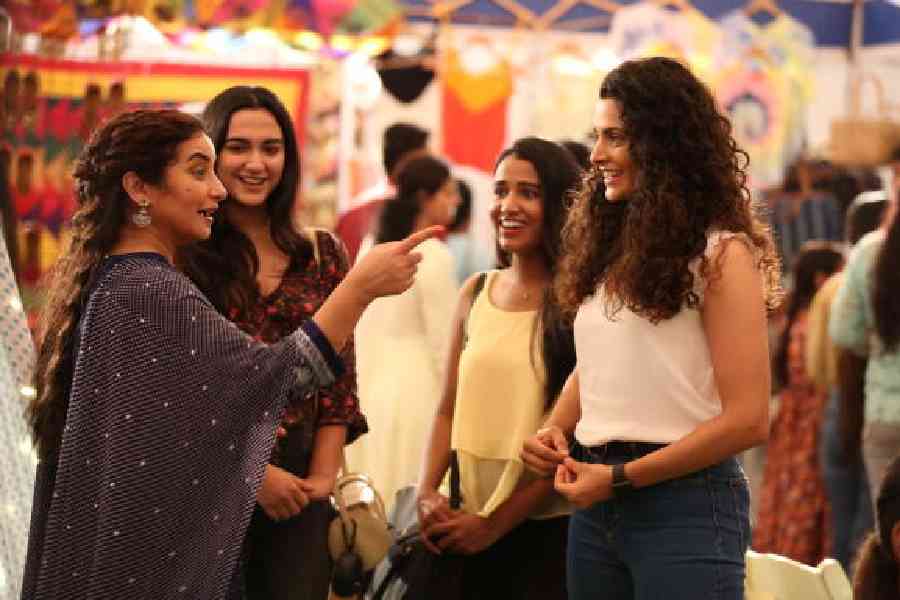This Friday, Tahira Kashyap Khurrana is all set to make her feature film directorial debut with Sharmajee Ki Beti, that will stream on Prime Video. The story of five women across different ages and circumstances, but with a common surname, the film stars Sakshi Tanwar, Divya Dutta and Saiyami Kher in principal roles. t2 caught up with Tahira on the journey of the film and why she didn’t want to play the ‘star wife’ card.
Sharmajee Ki Beti has had a bit of a wait for a release. What are the emotions like as we approach D-day on June 28?
It is a relief for me and for the people around me. When I told them it was coming out, more than happiness, their reaction was: ‘Okay, finally!’ I am glad that the film has found a beautiful home with Prime Video. I am grateful that they believed in this film. We showed it at the MAMI film festival last year. It got a decent response there and since then, there has been curiosity around the film.
What triggered the idea of the film?
I am a storyteller. I have stories to tell almost every day because I don’t know how else to live! I just need to write. I go to my social media and start putting up stories. I have so many stories that I don’t know what to do with them!
Sharmajee Ki Beti came from a place of authenticity, purity and completely not corrupted by algorithms and by what works and doesn’t work and what works for a specific female age group.
Women exist across the spectrum. It is not that everybody above 30 is menopausal and is crying all the time. Women below 20 somehow don’t seem to exist (in our stories). It was important for me to tell compelling, heartfelt stories. My writing comes from a place of humour. All the five ladies in this film are dealing with some issue or the other, but how they deal with it is comical, cute and humorous. And somewhere in between, there is something for us to take away. These stories have come from deep observation and have also been experiential.
Which of these women is closest to your experience in life at various stages?
All of them! When I was a teen, without giving anything away, I had that issue, as crazy as it may sound, which the teenager in the film has. In my 20s, I was a sportswoman and had a crazy appetite. I would eat as many parathas as my boyfriend and a lot of women had a problem with that! I don’t know what goes on in people’s heads, but girls with a big appetite are not seen as feminine.
When I shifted to Bombay, I didn’t know what to do in a city where no one has the time to even exchange a few words. Also, it is overpopulated. Every square foot is occupied. And despite so many people around, there is such loneliness.
In Sharmajee Ki Beti, that is the phase that Jyoti, played by Sakshi Tanwar, is going through. She is a working woman. My mother has always been a working woman and somehow, all the complaints about everything going wrong in your life are because of your mother and not because of your father. Every issue that I had was always with my mom, I never held my dad accountable for anything.
Sometimes, an awkward joke is made and the woman doesn’t know how to react. Mostly, we tend to laugh it off. But when you go home you think that why did you respond in such a way to a sexist joke? That is because of generations of conditioning that women go through. There is this DNA memory that travels from one generation to the other. But at least when it comes to millennials, we are questioning things. Storytelling is my way of communicating everything... anger to frustration to happiness.
You have an eclectic cast. What special something did each bring to their roles?

Tahira Kashyap Khurrana
They all come from a place of credibility and authenticity. They are also great actors. Divya Dutta has amazing energy on set, which makes you think that she is doing her first film. Despite making so many films, she was nervous at the shoot. I appreciated that kind of energy and it was my biggest takeaway. For every film, I am going to learn to be excited like a kid coming to set for the first time.
We have seen Sakshi play a certain type on television. She surprised me in this film, playing a strong middle-class woman who has a career and who also wants to strike a balance at home.
When it came to Saiyami (Kher), I wanted to cast someone who knows sport. She plays a cricketer and she is into sports majorly in life. In fact, she is training vigorously to participate in Iron Man this year. All these women are passionate about their lives and they extended the same to their characters.
The two teenage girls — Vanshikha and Arista — will bring on a smile. They are very good discoveries. When the film was screened at MAMI, the audience came out and was talking about these two girls. Most viewers had a different woman as a favourite and that was a huge triumph for me.
The women in the film share the common surname Sharma, which contributes to the title. It is also a riff on the popular ‘Sharmaji ka beta’, which symbolises the habit of most Indian parents to compare their children to that of others. Were you ever subjected to something like that or saw it around you while growing up?
Both my parents were working people. That was quite an anomaly in a small town like Chandigarh. The household responsibilities were divided equally. My father would chop the vegetables and my mother would cook. My father used to dress me up for school because my mother would leave early for work.
In Class XI, when I stepped out into the world and started going to friends’ houses, I experienced firsthand the gender inequality that exists in most Indian households. Plus, the whole aspect of competition reared its head. I had a friend who never did well in school and there was so much pressure on our generation to score good marks. The board exams were approaching and I heard parents telling their wards not to hang out with that girl because she was ‘not a good influence’.
Till Class X, that girl would get 50 per cent but in Class XI, she suddenly got 83 per cent because she took up the subjects that she did well in. Not all of us are supposed to be mathematicians or physicists or biologists. We millennials had to sometimes give in and study subjects we didn’t have an aptitude for. Most of this generation, however, doesn’t have to do that. They have the freedom to choose. I hope the parents of today let them explore themselves in the fields which is best conducive to their growth.
You had to wait a long time for this film to release. People would think that being Ayushmann Khurrana’s wife would have made things a little easier for you...
Just not for our industry, even otherwise too, if your partner or husband has made it before you, everyone thinks it will be a cakewalk for you. Honestly, it was not a route that I wanted to take. It was a personal choice not to. I am not condemning anyone who has done so, it is absolutely fine if it suits their purpose. But whether you use that choice or not, at the end of the day, you have to be good at your work and people need to like what you have made.
As far as being a ‘star wife’ is concerned, when I was asked about it the first time, I was like: ‘How does one make it to this star wives club?! What is the syllabus? How does one qualify?’ (Laughs)
Have you watched or read anything recently that has broken stereotypes as far as women are concerned or shows them from a new perspective?
I just re-read The Palace of Illusions (by Chitra Banerjee Divakaruni). It is from Draupadi’s point of view and simultaneously, I am listening to a Spotify podcast on The Mahabharata by Sudipta Bhawmik, which is told from the man’s perspective. It is the same story but the lens through which it is viewed makes a huge difference.
I also enjoyed Crew. I am very happy that it did well with three women (Tabu, Kareena Kapoor Khan and Kriti Sanon) at the centre, that it was completely unapologetic and that there is no message in it... it’s just three women having a good time. I like it when a film doesn’t rub it in with: ‘This is my gender, this is my agenda.’ I liked Heeramandi as well. I liked Everything, Everywhere All At Once. I love it when women do crazy stuff, it feels amazing!











